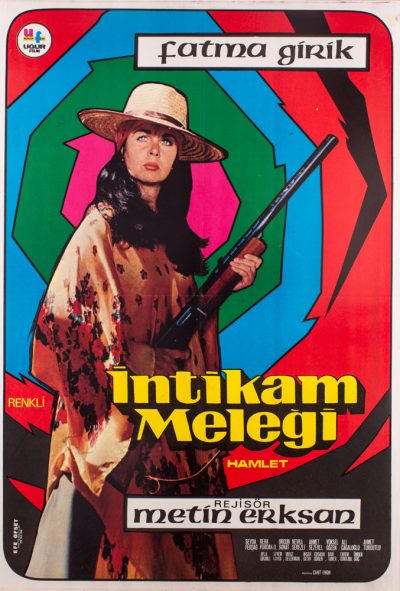★★★
“To be or not to be… NOT to be…”
 Okay, the above is shamelessly lifted from The Last Action Hero, in which there’s a spoof trailer for Arnold Schwarzenegger as Hamlet. But it applies just as much to this, which is remarkably progressive considering its origins; 1977 Turkey was not exactly in the forefront of women’s liberation. Yet here we are, with a modernized and severely truncated version of Shakespeare’s story. This runs 86 minutes, compared to 242 minutes for, say, Kenneth Branagh’s Hamlet. But it hits the main spots, even if only in passing: for instance, Hamlet’s soliloquy shows up, though “Alas, poor Yorick” gets short shrift.
Okay, the above is shamelessly lifted from The Last Action Hero, in which there’s a spoof trailer for Arnold Schwarzenegger as Hamlet. But it applies just as much to this, which is remarkably progressive considering its origins; 1977 Turkey was not exactly in the forefront of women’s liberation. Yet here we are, with a modernized and severely truncated version of Shakespeare’s story. This runs 86 minutes, compared to 242 minutes for, say, Kenneth Branagh’s Hamlet. But it hits the main spots, even if only in passing: for instance, Hamlet’s soliloquy shows up, though “Alas, poor Yorick” gets short shrift.
In case you’d forgotten: Hamlet (Girik) returns home from drama school in America, after the cold-blooded assassination of her father by her uncle (Yurdakul), who has married Hamlet’s mother (Ferdag). After seeing her father’s ghost, Hamlet decides to feign insanity, in order to get to the truth. When she stages a play, The Murder of Gonzago, depicting what she believes to be the true events, and her uncle’s rapid, guilty exit, it’s time for Hamlet to take her bloody revenge, and consign her uncle to the same end to which he sent her father.
It all takes place against a strange soundtrack, which includes both Shostakovich’s score to the 1964 version of Hamlet made in Russia (officially sanctioned or not), and Silver Convention’s disco hit from a couple of years earlier, Fly Robin Fly. It has its share of surreal or even avant-garde imagery too, particularly when Hamlet is playing at being mad, such as conducting an imaginary orchestra – the instruments are there, just not anyone to play them – in the middle of a field. The play, meanwhile, comes over as a bizarre cross between A Clockwork Orange, Manos, Hands of Fate and an early Kate Bush video.
The above makes it sounds rather less interesting than it is, even for someone like me, whose knowledge of Shakespeare is fairly limited. The main thing which it has working in its favor, is Girik, who was the veteran of literally hundreds of Turkish films in the sixties and seventies, before becoming the mayor of a district in Istanbul towards the end of the eighties. Even when the acting required here is nothing more than pulling faces (as quite often), she has sufficient charisma and delivers her (frequently ludicrous) lines with enough intensity to sustain the viewer’s interest.
The other tweaks resulting from the gender reversal have their moments too. For instance, Ophelia’s descent into madness takes on a rather different tone when she’s no longer a loony young girl. The same goes for Hamlet’s relationship with Rezzan and Gul, the female versions of Rosencrantz and Gildenstern, which feels something akin to a Turkish version of Sex and the City. In the end, I’m probably glad Erksan – best known in the West for Seytan, his knock-off of The Exorcist – opted for a brisk adaptation of the bard. While decent at its length, I strongly suspect that 242 minutes of this approach would have seemed considerably less rather than more.
Dir: Metin Erksan
Star: Fatma Girik, Sevda Ferdag, Reha Yurdakul, Orçun Sonat
a.k.a. Intikam Melegi/Kadin Hamlet




